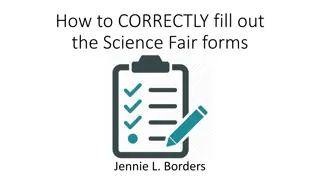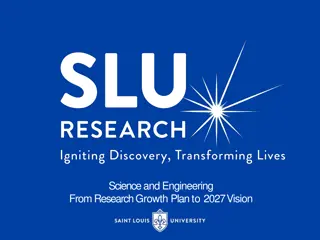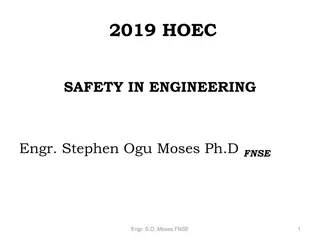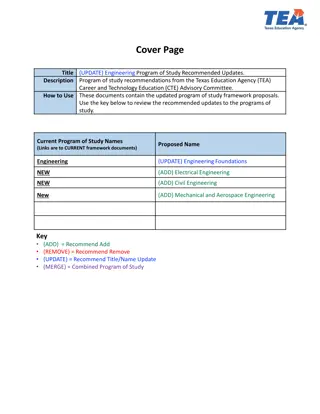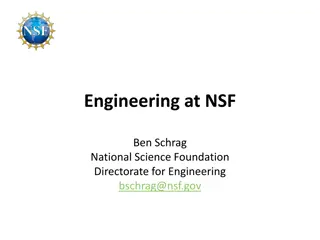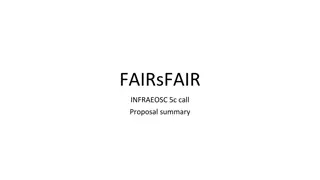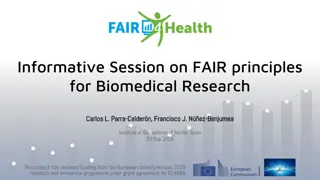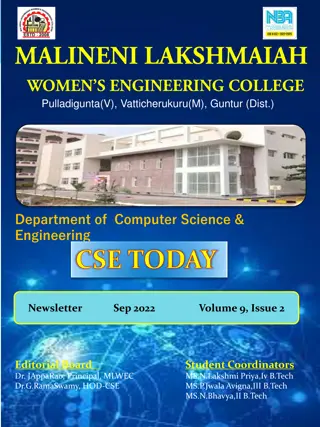Guidelines and Regulations for Science and Engineering Fair Projects
Ensure completeness of required forms before conducting any experimentation for the Collier Regional Science and Engineering Fair. Local rules take precedence over state and international rules. Projects involving vertebrate animals, hazardous biological agents, or chemicals require approval from the Scientific Review Committee or Institutional Review Board. Special projects involving vertebrate animals or potentially hazardous biological agents have specific criteria that must be met. Guidelines are outlined for the use of these materials and the submission process for review. Compliance with these regulations is essential for project approval and participation in the fair.
Download Presentation

Please find below an Image/Link to download the presentation.
The content on the website is provided AS IS for your information and personal use only. It may not be sold, licensed, or shared on other websites without obtaining consent from the author.If you encounter any issues during the download, it is possible that the publisher has removed the file from their server.
You are allowed to download the files provided on this website for personal or commercial use, subject to the condition that they are used lawfully. All files are the property of their respective owners.
The content on the website is provided AS IS for your information and personal use only. It may not be sold, licensed, or shared on other websites without obtaining consent from the author.
E N D
Presentation Transcript
FORMS to be complete PRIOR to experimentation All projects MUST complete 1A, 1B, 3, Research Plan Abstract (official SSEF), Conclusion (after experimentation) Special Projects require additional forms 1C Regulated Research Institution 2 Qualified Scientist 4 Human Subject and Informed Consent 5A Vertebrate Animal 5B Vertebrate Animal 6A Potentially Hazardous Biological Agents 6B Human and Vertebrate Animal Tissue 7 Continuation Projects Form
Research Plan Fillable Form Have Students use this form The research plan (and all other forms) can be accessed and downloaded from the CRSEF website. Or click the document to the right.
Rules Local rules supersede state, which supersedes ISEF CRSEF Rules SSEF Rules ISEF Rules
SRC VS IRB Scientific Review Committee Institutional Review Board Any experiment that involves vertebrate animals, potentially hazardous biological agents, or hazardous chemicals, devices or activities require that the SRC committee approves the research plan PRIOR to any experimentation. Any project that involves human subjects requires that the IRB committee approve the project PRIOR to any experimentation.
Special Projects Vertebrate Animals Live, nonhuman vertebrate mammalian embryos or fetuses. Tadpoles Bird and reptile eggs within 72 hours of hatching. All other nonhuman vertebrates, including fish at hatching or birth. Research plan MUST address reasons WHY the vertebrate is the best choice as the subject of the project (see the 4 R s p.11) Replace, Reduce, Refine, Respect Please send all vertebrate research plans to Mary Marshall before October 15 for review.
Special Projects PHBA s Potential Hazardous Biological Agents Bacteria, Viruses, Mold, Algae, Tissues BSL 1 projects E.coli K-12, any microbial project in which the culture is NEVER opened. Double bagged, taped Petri dishes, sealed tubes. Detailed descriptions of collection, aseptic techniques and disposal methods for media and cultures. BSL 2 projects No junior level student may conduct a BSL-2 project. (opening an actively growing culture or sub-culturing) Send ANY project that grows or cultures a microbial agent to Mary Marshall for review no later than October 15.
Special Projects Tissues Studies involving fresh/frozen tissue, blood or body fluids obtained from humans and/or vertebrates may contain microorganisms and have the potential of causing disease. Blood Muscle tissue Feathers plucked from living or non-living birds Exempt tissues include Fingernails, shed feathers, sterilized teeth, fossilized specimens, prepared fixed tissue, pasteurized milk, fresh or frozen meat products from the grocery, plant and non- primate established cell lines. Advice: if the project involves tissue of ANY kind, contact Mary Marshall to confirm exemption status. (send research plan)
Special Projects Human Projects Any project that involves human participants must be approved by the IRB BEFORE any experimentation begins. Physical activities, ingestion of ANY substance, student designed invention testing by anyone other than the student, behavioral observations, surveys, etc. Some human projects may be exempt under CERTAIN conditions: Data record/review from pre-existing data bases that do not involve any human interactions. Behavior observations that do not in any way interact or affect the individuals being observed The researcher does not manipulate the environment The researcher does not record any personally identifiable data Be on the side of caution submit ANY human project research plans to Mary Marshall before October 15 for clarification of exemption status.
Special Projects Hazardous Chemicals/Devices/Activities For ANY project using a chemical (whether household or not, please consult the SDS (safety data sheet) for that chemical. If it has an NFPA rating of 1 or higher, the project will need SRC review PRIOR to any experimentation. Safety procedures are very important. Consult p. 18-20 in the ISEFrule book for more information regarding chemicals. Consider the SPHERE OF INFLUENCE use the minimum concentration necessary and all disposal procedures MUST be included in the procedure. Weapons must be discharged at a certified range with a range officer. (SRC pre-approval required) Power tools may not be used by junior researchers. The procedure and safety precautions are very important in projects that require the use of power tools.
NFPA Rating SDS or MSDS sheets
Household Chemicals Provide an SDS sheet with the Risk Assessment Form 3 / check the NFPA rating Vitamins Gasoline Paint thinner Alcohol Flammables Moth Balls Diesel Cleaners Safety precautions MUST be included in the procedure, not just on the risk assessment form. It is preferred that they be part of the procedure, not in a separate section. Sources must be reliable not my teacher or my parent . Cite the SDS sheets in the bibliography.
For Projects that Require Approval OCTOBER 15, 2015 - DEADLINE Submit electronically to crsefsrc@gmail.com Include student name, grade, school in subject line. Submit a DETAILED research plan with safety precautions, bibliography and disposal techniques (if required) Submit the required signed forms. Please indicate the desired email address for project return. Contact information: Mary Marshall (SRC/IRB Chair) crsefsrc@gmail.com 239-377-0431(office) or 239-307-9022 (cell)



